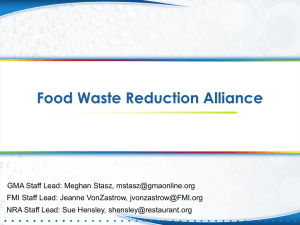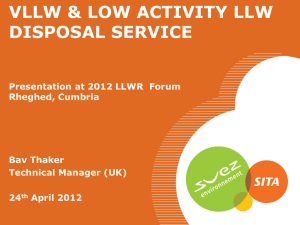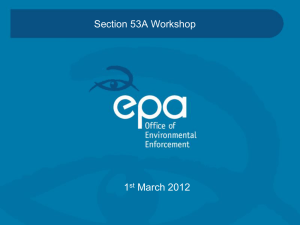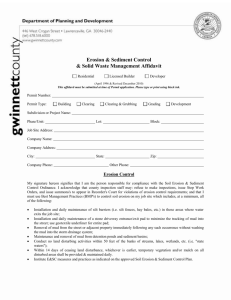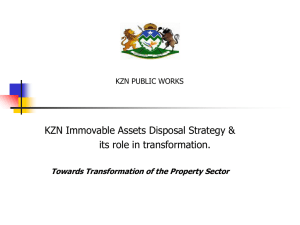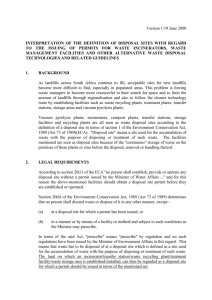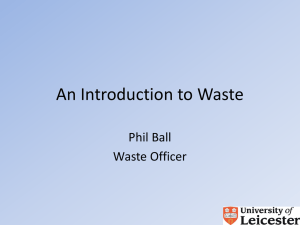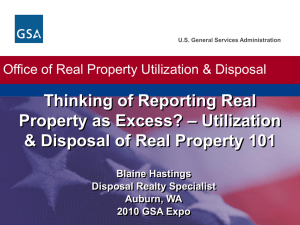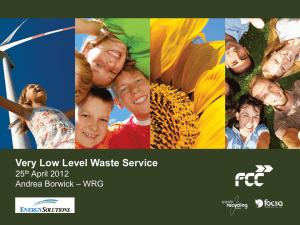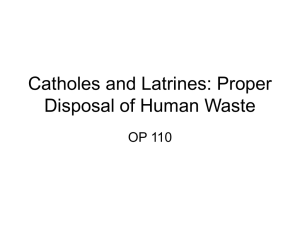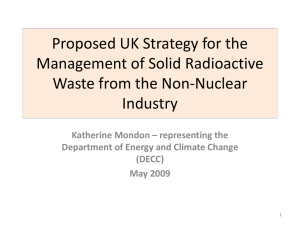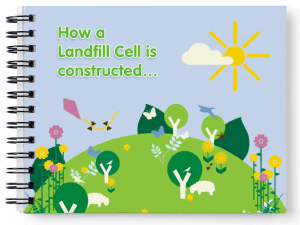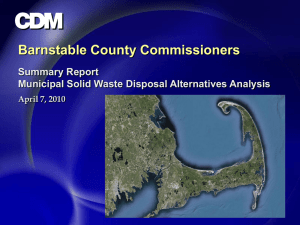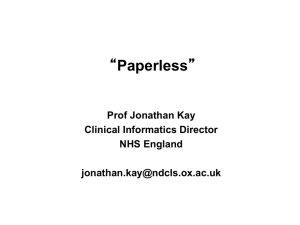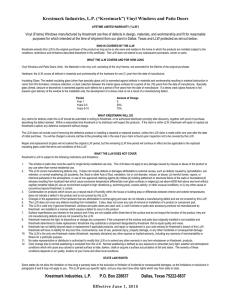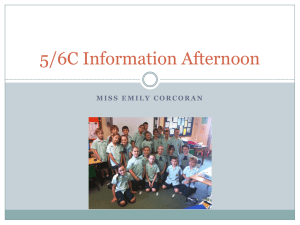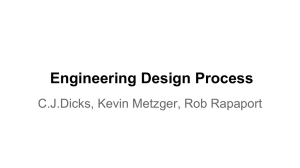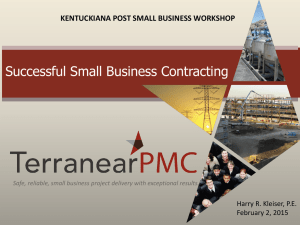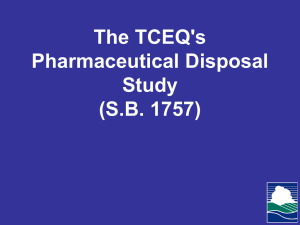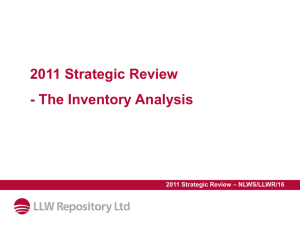Presentation, Dr Juliet Long & David Bennett
advertisement
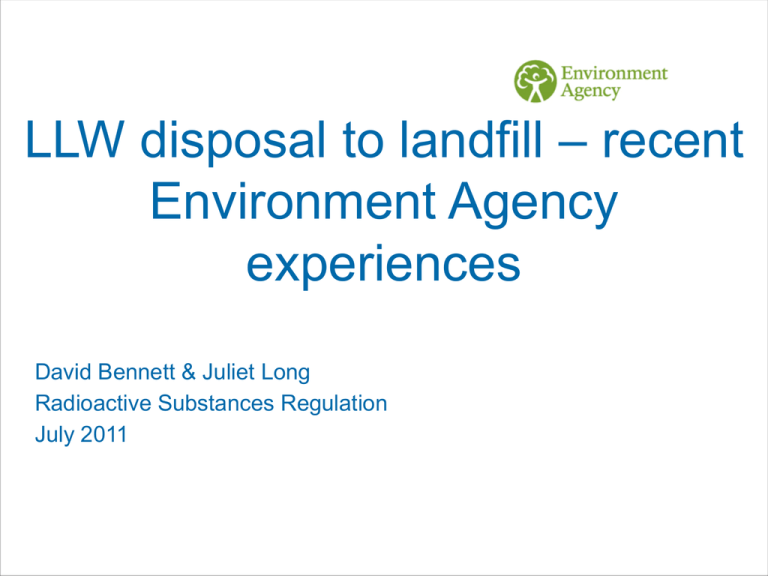
LLW disposal to landfill – recent Environment Agency experiences David Bennett & Juliet Long Radioactive Substances Regulation July 2011 Structure Our ambitions Recent developments Permitting landfill disposal of LLW Experiences of working together Our Ambitions Proper protection of people and the environment Progress in dealing with the nuclear legacy Reducing risk to this generation and the burden on future generations Help inform and enable progress, provided people and environment protected People have confidence in our decision making Outcomes? Radiation doses that are as low as reasonably achievable Fit-for-purpose regulatory framework robust, transparent, participative and integrated decision-making based on evidence consistent with national policy Environmental hazard and risk stabilised and reduced Disposal sites –applications for permits for disposal to landfill Consistent with national policy Supported by ‘environmental safety case’ Consigning sites - inter-site transfers of LLW Approach under Environmental Permitting Regulations 2010 (EPR): - no need for statutory notification of local authorities Operators need to let the local authority know the origin and nature of the waste before receiving the first shipment from a consignor The permit will specify each permitted combination of waste and disposal route permit transfer to either named sites or ‘the holder of a permit under the Environmental Permitting Regulations to receive and dispose of HV-VLLW’ Schedule 3 – Specified transfers to other premises Specific waste type Metallic LLW Person to whom waste may be transferred The holder of a permit under the EPR to receive and dispose of LLW at .. Purpose of transfer For subsequent treatment and / or transfer for disposal Radionuclide / group of radionuclides Any Calendar year limit No limit Annual volume limit No limit Inter-site transfers No barriers to waste treatment / disposal BUT not unrestricted: Operators must still consider the options for disposal before generating waste Disposal must still represent BAT and relevant Government policy e.g. proximity principle We may decide to identify specified sites as necessary e.g. to deliver the requirements of the proximity principle or the waste hierarchy, but would not normally expect to do so Records of waste transfer must be kept by consignor and receiving site operator Public acceptability and decision making Stated as an aim in both National LLW policy and strategy We don’t place requirements on this: At receiving site – we would consider content of concern, rather than forming judgements on degree of concern (i.e. voting) At consigning site – EPR approach of not requiring specific routes to be permitted renders Policy approach out of date Some ambiguities in Policy and Strategy wording Kings Cliffe inspector recognised it as a difficult area Integrated Waste Management Integrated waste strategies are important considerable progress across NDA and other sites NDA, regulators and MoD working together to take an overview of Integrated Waste Management strategy development and implementation inc. revision to IWS specification Continued support to LLW Management Programme through Programme Delivery Group LLWR ESC review 2002 Cases ‘inadequate’ Disposal to Vault 8 only Vault 9 built (storage only) Authorisation required updated ESC by May 2011 Technical basis for future permitting decision Need for certainty - Industry need – status quo unacceptable LLWR > £8m, Our review > 5 person years Key objective: Reach a clear and justified regulatory decision on future operations at the LLWR, underpinned by a robust technical review Be proportionate and timely Good communications with Cumbria CC on EPR permitting – Planning interface Outline timescales - ESC submitted Technical Review May ‘11 - Initial review Aug ’11 – Apr ’12 - Core technical review / audits May ’12 – Apr ‘13 - Prepare conclusions & publish Mid to late ’12 - Application for further disposal - Consult application (3 months) - Draft decision / permit - Consult draft decision (3 months) - Decision Early autumn ’13 Permit Review May ’11 – July ’11 Landfill disposal of LLW Kings Cliffe Lillyhall Clifton Marsh Keekle Head WRG Lillyhall landfill HV-VLLW application Non-hazardous, household and asbestos waste site Application under RSA93 received May 2009 Existing planning permission until 2014 For HV-VLLW up to 26,000m3/yr, 582,000m3 total Single consultation on application Objections on grounds of proximity and socio-economic impacts Article 37 decision received March 2011 EPR permit granted April 2011 Local Authorities maintaining objections Planning permission renewal required by 2014 Kings Cliffe Controlled Burial application Hazardous waste landfill Application for 200Bq/g under RSA93 July 2009, < 250,000m3/yr Supported by a detailed radiological assessment Following our review of this we reduced limits requested by Augean by factor of 18 Two consultations (application & “minded to”) Vigorous objection on broad grounds – need, safety and socio-economic impacts, process, perception Article 37 decision received in January 2011 EPR Permit granted May 2011 along with planning permission - SoS decision Clifton Marsh Controlled Burial application Currently permitted to receive waste from Springfields / Capenhurst Non-hazardous and asbestos landfill Application for < 1000Bq/g under RSA93 Nov 2009 < 250,000m3 by 2020 Article 37 decision received March 2011 Planning permission until 2015 Single consultation on application and draft permit started 2 June 2011 Keekle Head proposals Dedicated facility in disused coal quarry workings 1 million m3 / up to 500Bq/g (mostly short lived) / 50-60 yrs A ‘dry site’, covered during operations Planning application submitted 2010 Proposals inconsistent with Cumbria County Council’s policies Local opposition including pressure groups We have been flagging concerns to CCC as part of their planning consultation e.g. groundwater impacts and River Keekle restoration Experiences of Engagement with Local Authorities Review across nuclear regulation group suggest a ‘variable’ experience: Primarily via consultation during permitting • Correspondence & direct briefings (eg Preston CC Environment committee) Site Stakeholder Groups & planning for emergency exercises Routine & ad-hoc in places eg. Cumbria, Allerdale Nuclear issues Group Long term & regular engagement via the Cumbria MRWS Partnership Is there more we can do? Opportunities Accompanied site visits, attendance at annual reviews? Bespoke workshops? “tumbleweed moment” Better understanding of contacts & role? “I am not sufficiently aware of their role and the scope of their activities” “Useful to be able to pick up the phone easily” “The benefit [with the Partnership] has been the long process and lengthy engagement” “Are there any LA ‘trade mags’ or newsletters” Summary Considerable changes have taken place, and will continue to happen Policy and strategy development & implementation Ways of working within industry Our regulatory approach under EPR Supply chain – new participants offering disposal routes Variable experience in our ways of working with Local Authorities Keen to explore ways of improving and understanding each others’ roles, expectations, and ways of working together
